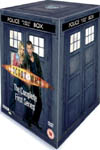DVD Extras (box sets only) include:
The TARDIS interior gets a mention, but is not seen in this story, and is not really missed either. The concept was well represented during the beginning of the season; there's no need to torture us further with the dark ugly inferior design we seem to be stuck with now. The three main characters make themselves known immediately and easily, and settle into exploring their new setting right away. Excellent. But if only it were an alien planet, which is so desperately needed at this point in the season. Instead, we've got basically a repeat of the setting for "The End of the World" (story no. 162), minus the exciting visuals and imaginative ideas. The year 200 000, on a space station orbiting... what else? ... Earth. Excuses are written in to explain why there are no aliens in the setting, and floor 139 where our exploration starts manages to look so much like a common present day shopping mall, that one wonders when the TARDIS will really be able to demonstrate an ability to travel the universe. Then there's the irritating sound of a present day radio alarm clock going off all over the place, further breaking the illusion. A bit of bright dialogue delivered well by the actors and the occasional establishing model shot are the only things really helping to put the illusion back together again. Russell T. Davies also hints here to have an almost blind faith in the current form of television, allowing it almost no real growth or development for 198 thousand years. One would expect more independent news-sharing tools, like the internet, to dwarf television in the far future, yet this isn't even mentioned. Floor 500 also has a big problem: the characters never get to do anything decent there. And the Doctor misses out on the final climactic act, which has also been happening too often this season. (Elaborating on these points necessarily involves spoilers, so that's been saved for the In-depth analysis version of this review.) Floor 16 fares the best. It looks and sounds and feels suitably futuristic, and more importantly, Adam gets to discover and explore a complete and interesting sci-fi process there, along with its side-effects and extra bells and whistles. This is essential to giving the story some worth, although the process is of questionable wisdom and social value, as the Doctor points out at one stage. But listen carefully to the words the Doctor uses to express this. It seems to betray the philosophy of the writer, that "time" is now wrong, that the history of the year 200 000 used to be different and is now somehow changed. Again, the Doc has found himself on a separate timeline, also known as a parallel universe, yet can't quite recognize that for what it is. Even if he did, though, I wouldn't blame him for wanting to leave his heroic mark on the place. In fact, I'd be disappointed if he didn't. "The Long Game" delivers well on that at least, and in the end remains emotionally satisfying. Some of the best bits are undoubtedly in the little coda to the story. Well done.
This story has become available on DVD:
Note: The 13-episode box sets contain commentaries, behind-the-scenes featurettes, and other extras. The 4-episode volume only features the plain episodes. Comments on this article are welcome. You may contact the author from this page:
|








